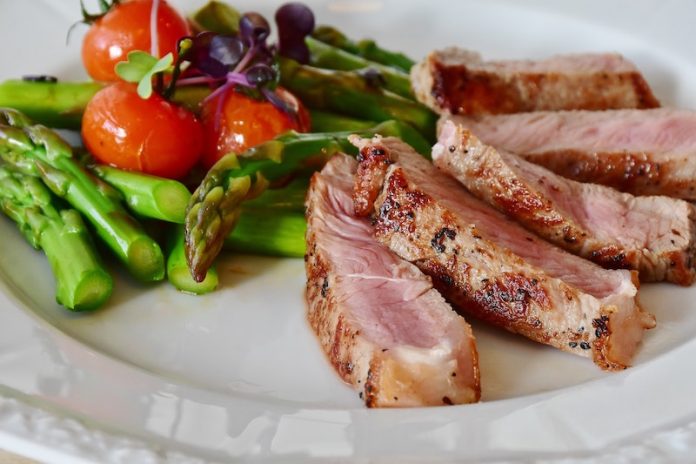
In a new study from the University of Alberta, researchers suggest if you’re being treated for cancer, don’t leave meat, fish and dairy off your plate.
Though it may seem healthier to avoid animal-based proteins like red meat, relying on plant-based protein alone isn’t a good plan while fighting cancer.
The team suggests that when you have cancer, the majority of protein in your diet should be animal-based, and it is safe to eat.
Proteins like red meat or pork tend to get a bad rap when lumped in with their highly processed cousins like cured ham, bacon and salami, which have been linked to causing cancer.
In the study, the team reviewed available scientific data and suggest that meat, fish, eggs, poultry and dairy offer better muscle-building properties than plant-based proteins, such as legumes.
Animal-based protein is higher in amino acids, which are vital for building and growing new muscle tissue, as well as helping people better tolerate cancer treatments like chemotherapy.
Previous research has already shown that the more muscle you have, the less severe the toxicity of cancer treatment, your quality of life is better and you can live longer.
Cancer treatments can also erode muscles through poor appetite, bedrest or the stress of surgery, so people undergoing treatments need more protein than healthy individuals.
Many people don’t realize the body’s nutritional needs differ during cancer treatment, versus eating for cancer prevention.
The amount of protein a person needs to maintain muscle goes up significantly during treatment.
The researchers recommend that at least 65 percent of total protein intake during treatment be from animal-based foods.
Combined with plant protein, it’s likely the best way to support muscles and avoid malnutrition.
People being treated for cancer would have to eat much more plant-based proteins to get the same benefits of also including meat, fish, dairy or eggs on their plates.
Current recommendations suggest people should consume 1.2 to 1.5 grams of protein for every kilogram of body weight daily during cancer treatment.
The easiest way to increase intake is to include a protein source in every meal and snack.
Adding tuna or leftover chicken to a salad or casserole, pairing some cubed cheese with fruit or whole-grain crackers, or adding yogurt to a snack or as a dessert are all easy ways to include animal-based protein sources.
The researchers also recommend that those sticking to an entirely or mostly plant-based diet during cancer treatment should see a dietitian to ensure they are getting enough protein.
If you care about cancer risk, please read studies about vitamin that is particularly important for your cancer prevention, and herb that may help treat pancreatic cancer.
For more information about cancer risk, please see recent studies about anti-diarrhea drug that may help kill brain cancer, and results showing why green tea could suppress cancer.
The study is published in Clinical Nutrition and was conducted by Carla Prado et al.
Copyright © 2022 Knowridge Science Report. All rights reserved.



